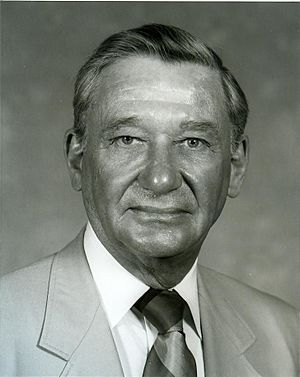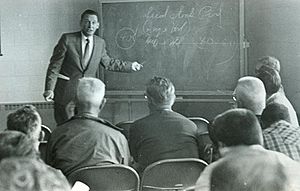Edward R. Hauser facts for kids
Quick facts for kids
Edward R. Hauser
|
|
|---|---|
 |
|
| Born | August 29, 1916 |
| Died | September 8, 2014 (aged 98) Fitchburg, Wisconsin
|
| Nationality | American |
| Alma mater | University of Wisconsin–Madison |
| Known for | reproductive physiology, beef cattle management |
| Scientific career | |
| Fields | Animal Science |
| Institutions | University of Wisconsin–Madison, Clemson University |
| Doctoral advisor | Gordon E. Dickerson |
Edward R. Hauser (born August 29, 1916 – died September 8, 2014) was an American scientist who studied animals. He was a professor and led the Department of Meat and Animal Science at the University of Wisconsin–Madison. He was known for his important research on beef cattle.
Early Life and Education
Edward R. Hauser was born on August 29, 1916, in La Crosse, Wisconsin. He was one of four children. His parents were immigrants from Switzerland. He grew up on a family dairy farm.
He later went to the University of Wisconsin–Madison. In 1938, he earned his first degree in Animal Husbandry. He was also part of the wrestling team there in 1936.
Advanced Studies
In 1939, he earned a master's degree in Animal Science. He got this degree from Oklahoma A&M University. During this time, he studied how sheep reproduce. After that, he became an assistant professor at Clemson College in South Carolina.
In 1943, Edward Hauser joined the U.S. Navy. He served during World War II. He was an officer on the ship USS Chincoteague (AVP-24). He took part in important battles like Peleliu, Iwo Jima, and Okinawa.
After the war ended in 1945, he helped keep peace in Shanghai, China. He assisted the Chinese people in removing Japanese forces from their country.
Return to Academia
After leaving the Navy, he went back to Clemson College in 1946. He became an associate professor there. In 1947, he started working on his PhD at the University of Missouri. He focused on reproductive physiology. His studies looked at how genetics control the development of male pigs.
Career at Wisconsin
In 1949, Edward Hauser became an assistant professor. He joined the Department of Meat and Animal Science at the University of Wisconsin-Madison. He stayed at this university for the rest of his career. He retired in 1988 as a professor emeritus. This means he kept his title after retirement.
Important Research
Professor Hauser was famous for his research on beef cattle. He studied how efficiently cattle grow and reproduce throughout their lives. He paid special attention to how a cow's genes and its environment work together.
He often used identical twin cattle for his research. This helped him see how different factors affected them.
Discoveries in Reproduction
He also made important discoveries about how light affects cattle. He showed that the amount of daylight (called photoperiod) changed when cattle reached puberty. It also affected how fertile cows were after giving birth. This was a new and important finding at the time.
Later Life
In his retirement, Edward Hauser enjoyed many hobbies. He loved to travel, read, and go boating. He also spent time with his family and friends. He volunteered at the Swiss Historical Museum in New Glarus, Wisconsin. He even donated money to support the museum.
 | John T. Biggers |
 | Thomas Blackshear |
 | Mark Bradford |
 | Beverly Buchanan |


